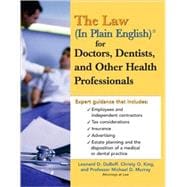
| Acknowledgments | |
| Introduction to the New Edition Introduction to the Original Edition | |
| Organizing Your Business | |
| Sole Proprietorships | |
| Partnerships and Joint Ventures Limited Partnerships | |
| What You Do Not Want: Unintended Partners | |
| Corporations S Corporations Limited | |
| Liability Companies Limited | |
| Liability Partnerships | |
| Minority Owners Hybrids | |
| Business Organization Checklist | |
| Naming Your Practice Business | |
| Structure Officers and Owners | |
| Capitalization | |
| Housekeeping | |
| Employee Benefits | |
| Tax Treatment | |
| Advertising Government | |
| Regulation Problem Areas | |
| Other Issues | |
| People Who Work for You Independent Contractors | |
| Employees | |
| Employment Contracts | |
| Other Considerations in Hiring | |
| Hazards in the Workplace | |
| Discrimination Harassment | |
| Employee Handbooks | |
| Zero Tolerance Policies | |
| Family and Medical Leave Act | |
| Termination of Employment | |
| Contracts | |
| Types of Contracts | |
| Understanding Contract | |
| Principles: Offer, Acceptance, and Consideration | |
| Oral or Written Contracts? | |
| When Written Contracts Are Required | |
| Contracts with Businesses | |
| Judging the Cost of Written Agreements | |
| UCC Confirming Memorandum | |
| Additional Terms | |
| Summary of Essentials to Put in Writing | |
| Borrowing from Banks | |
| The Loan Proposal Is Your Practice Creditworthy? | |
| Analyzing Your Practice's | |
| Potential Options for Owners of New Practices | |
| Short-Term or Long-Term Financing? | |
| How Much Money Will You Need? | |
| What Kind of Collateral Do Lenders Require? | |
| The Loan Application | |
| What Are the Lender's Rules and Limitations? | |
| Details of the Agreement | |
| The Importance of Communication When Problems Arise | |
| Collections | |
| Point-of-Sale Payments | |
| Cash Credit | |
| Cards and Debit Cards | |
| Personal Checks | |
| Ways of Encouraging Payment When the Payment Never Comes Bankruptcy | |
| Renting Your Office Premises | |
| Cost Term | |
| Recording the Lease | |
| Restrictions and Zoning | |
| Remodeling Utilities: Who Pays for What? | |
| Insurance for the Building and Common Areas Security, Hours, and Zoning Written Document | |
| Insurance | |
| The Basics of Insurance | |
| Law Ascertaining | |
| Risk Additional | |
| State Regulation Expectations versus Reality Overinsuring and Underinsuring | |
| Unintentional Undervaluing Property Covered | |
| What and When to Insure | |
| Keeping Insurance Costs | |
| Down Common Insurable Risks | |
| Malpractice | |
| Negligence in General | |
| The Standard of Care Breach of Duty Informed Consent | |
| Defenses Vicarious Liability | |
| Licensing and Hospital | |
| Privileges | |
| A Privilege, Not a Right Licensing Requirements | |
| Denial, Suspension, or Revocation of a License to Practice Hospital Privileges | |
| Patient Records and Privacy | |
| Health Care Records | |
| Content | |
| Requirements | |
| HIPAA Length of Retention of Records | |
| Special Confidentiality Statutes and Considerations | |
| Necessity of Consent | |
| Bookkeeping and Accounting Business | |
| Records and Accounting Business | |
| Year Cash and Accrual Bookkeeping Methods | |
| Current and Capital Expenditures | |
| Financial Statements | |
| Intangible Business Characteristics | |
| Sources of Information on Accounting | |
| Keeping Taxes | |
| Low Income | |
| Spreading Installments | |
| Deferred Payments | |
| Spreading Income Among Family Members | |
| Tax Advantages and Disadvantages of Incorporation S Corporations | |
| LLC Tax | |
| Election Taxes on Accumulated Earnings and Passive Investment | |
| Income Qualifying for Business Deductions | |
| Charitable Deductions Grants, Prizes, and Awards | |
| Table of Contents provided by Publisher. All Rights Reserved. |
The New copy of this book will include any supplemental materials advertised. Please check the title of the book to determine if it should include any access cards, study guides, lab manuals, CDs, etc.
The Used, Rental and eBook copies of this book are not guaranteed to include any supplemental materials. Typically, only the book itself is included. This is true even if the title states it includes any access cards, study guides, lab manuals, CDs, etc.
Excerpted from Law (in Plain English) for Doctors, Dentists and Other Health Professionals by Leonard DuBoff, Michael D. Murray
All rights reserved by the original copyright owners. Excerpts are provided for display purposes only and may not be reproduced, reprinted or distributed without the written permission of the publisher.